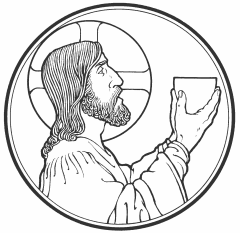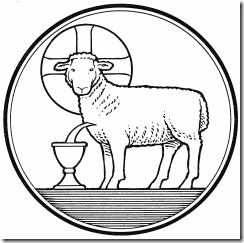This evening, it’s all about covenants. We hear in our Old Testament reading that the LORD “will make a new covenant with the house of Israel and the house of Judah.” That same passage is echoed in our reading from Hebrews. So, since we’re talking about covenants, what exactly is a covenant? The basic dictionary definition of covenant is “an agreement, usually formal, between two or more persons to do or not do something specified.” That definition could most likely work for us, but there is a biblical definition that we will focus on: “the conditional promises made to humanity by God, as revealed in Scripture.” While that definition narrows things down for us, there is one that captures God’s covenant even better: “the agreement between God and the ancient Israelites, in which God promised to protect them if they kept His law and were faithful to Him.”
That’s what we need to focus on – keeping God’s Law. But if you’ve read the Old Testament, you will find in very short order how we cannot keep God’s Law. It all started with a very basic command of God given to Adam and Eve: “You may surely eat of every tree of the garden, but of the tree of the knowledge of good and evil you shall not eat, for in the day that you eat of it you shall surely die.” That sounds pretty basic and self-explanatory: eat from any tree except the one tree that God said not to eat from. Oh, and by the way, if you eat from it, you will die. That should have been all the warning Adam and Eve needed. We don’t need caution tape or signs that say “Don’t Eat!” to know not to eat of it. And yet, with a little gentle persuasion, Adam and Eve did just that, they ate from it and they died.
So there you have it. That bond, that covenant, between creation and God destroyed. So what is God to do? Creation has been kicked out, sin a permanent part of creation from here until eternity. God does what God does best – He enacts a new covenant between God and man: the promise of a Savior. But as time goes by, that Savior is nowhere to be found. God’s people come and go and make an even bigger mess of things and God creates a new covenant with the people. Jeremiah records it for the people, but here is the key to this new covenant: “For I will forgive their iniquity, and I will remember their sin no more.”
Generations pass and Israel has failed to see the promised Savior. But just because there is no Savior to see doesn’t mean that there is no Savior. All things work according to God’s divine timetable. And so, on a Thursday evening after Jesus entered Jerusalem for the last time, gathered around the table for the Passover meal, Jesus creates a new covenant, THE covenant for the apostles and for the Church: “This is my body, which is given for you. Do this in remembrance of me…. This cup that is poured out for you is the new covenant in my blood.”
This heavenly food that Christ gives is indeed a new covenant. But what does this covenant mean? This harkens back to the covenant spoken of in Jeremiah. Turning to our Epistle reading from Hebrews, we hear these words: “Where there is forgiveness of these, there is no longer any offering for sin.”
That is what Christ has done for you. Christ has loved you and given Himself for you in His most holy Supper, and so we hear, “Therefore, brothers, since we have confidence to enter the holy places by the blood of Jesus, by the new and living way that he opened for us through the curtain, that is through his flesh….” Christ’s body and blood, broken and given, shed and poured out for you for the forgiveness of all of your sins. That is the Lord’s Supper.
For this He was born, and for this He died: to have the body and blood that would be offered on our behalf, to give us that body and that blood as food and drink, sweet and satisfying to sinners desperately in need of forgiving food. On that holy night in which He was betrayed, on the very eve of His crucifixion and sacrifice, while yet in His humility, He gave His body and His blood to us which He would give on the next day for us. For this He was born, and for this He died.
The woman has a Seed. That Seed has grown and is fruit. That fruit restores us to the garden’s fellowship and beyond. It undoes death and removes the curse. Here, in His Holy Supper, the Lord gives Himself to us, to eat and to drink, for the forgiveness of sins. This is what it is to be a Christian, not simply to be spared death but to have fellowship with God and to be sundered forever from the devil.
The fruit of the tree is on the paten and in the chalice. The angel of death passes over. He has no claim upon us. We belong to God. We bear His watery name in our Baptism. We eat at His table. We are His people and more. We are not merely guests, sojourners in His house for but an hour a week, but we are members of the royal family. We are not Gentile dogs hoping for crumbs, worshiping what we do not know. We, by the grace of God, are the Lord’s own beloved and immaculate bride. We belong to God. We are baptized. We eat at His table. We are gathered under the protecting shadow of the cross that draws ever closer.
This new covenant that God grants to us comes at great price – the death of Christ. But you are worthy of such a price, for the alternative is a creation forever separated from God. God does what He needs to do to join He and creation together again. On this night, it is by Christ giving to us His body and blood to eat and drink. This isn’t some symbol or representation of what Christ did 2000 years ago. No, this is His very body and blood, given and shed for you for the forgiveness of sins. This is Christ feeding you with Himself, the greatest food, the most necessary food.
When a person receives the bread and wine in Holy Communion, that person receives Jesus. As He said, “This is My body.” The heart of faith grasps the Word, which puts in the benefit, and then takes out the benefit, namely, all that Christ is according to His Word. The fruits of Jesus’ sacrificial love are in His Holy Supper for you to eat and to drink. Behold the man who gave Himself in the perfect act of love. Behold the man who on the night when He was betrayed, took bread, blessed it, broke it, and gave it to His disciples as His own body. Behold the man who poured His blood into the loveless mouths of His disciples to forgive their sins. Behold the man, veiled in bread and wine, given and shed for you for the forgiveness of your sins, for life and salvation.
This is the Church of the New Testament. This is the Church of a new covenant. Christ Himself is her mediator. Like the Church of the Old Testament, it is a testament, a covenant, of blood. Christ, our Passover, has been sacrificed for us. His body and blood have been rent asunder in death and joined again in the resurrection. This covenant has been fulfilled for you, fulfilled in the promise of a Savior, fulfilled in the broken and shed body and blood, fulfilled upon the cross and fulfilled in the resurrection of Christ our Lord. Amen.

